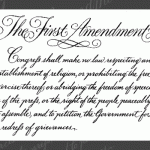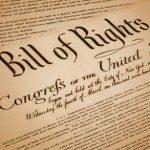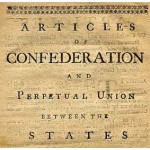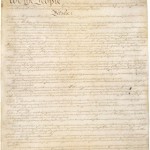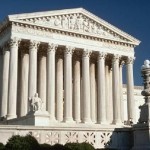Freedom of Religion is the first of our natural rights acknowledged in the First Amendment and limits government’s power to establish an official religion or interfere with a citizen’s exercise of religion. This is a recognition of freedom of religion, not freedom from religion. The first ten amendments to the US Constitution are referred to […]
Amendment I to the US Constitution: An Overview
The US Constitution grants enumerated powers to the central government. The drafters believed enumerating the powers limited the government. This was the argument Federalists made based upon an accepted rule for interpreting legal documents: Expressio unius est exclusio alterius (“the express mention of one thing excludes all others”). With that principle in mind, the government could not […]
Separation of Powers in the US Constitution: 1800 Years of Thought
All American schoolchildren are taught about the three branches of the federal government: legislative, executive and judicial. The Constitution’s establishment of these branches came from over 1800 years of political thinking. Most of the Founding Fathers were well educated and had studied classical political philosophy. The American government’s structure did not spring miraculously from the […]
Bill of Rights of the US Constitution: Promise Made, Promise Kept
The first ten amendments to the US Constitution are known collectively as the Bill of Rights. These amendments limit the power of the federal government. By virtue of the 14th Amendment, most government restrictions in the Bill of Rights apply to the states as well. The Constitution was a grant of power to the central […]
Article VII of the US Constitution: Ratification
The Articles of Confederation was the original operating document of the United States. Under the Articles, there was a weak central government with little authority to raise revenue. The Articles were written with the idea that each State was sovereign in its own right and like a little country of its own. Recognizing that each […]
Article VI of the Constitution: US Debt, Oaths & The Supremacy Clause
Article VI’s first clause was a bit of housekeeping in reassuring creditors of the United States that they would be paid by the new government formed under the Constitution. The third clause ensured that the government of the country would be secular and office holders at all levels of government would swear loyalty to the […]
Article V of the US Constitution: Amendments
The Founding Fathers worked hard to come up with a Constitution that would stand the test of time. They had both the foresight and humility to know that with changing times there would be a need to change the charter for the US government. Beyond that, the Declaration of Independence had asserted the People possessed […]
Article IV of the US Constitution: Obligations of the States & Federal Government
Articles I, II and III define the legislative, executive and judicial branches of government respectively. The US Constitution’s Article Four defines relationships among the governments regarding the following: recognition of each government’s official acts, how a State treats the citizens of another state, extradition of criminal fugitives, return of slaves, admission of new States, and […]
Article III of the US Constitution: The United States Supreme Court
The United States federal government is divided into three branches, separating government’s principal powers among different actors. The Constitution defines the powers of each branch. Article I defines the legislative, or congress. Article II defines the executive, or presidency. Article III creates broad outlines for the judicial, primarily the Supreme Court. Article IV defines the relations […]
Article II of the US Constitution: Election & Powers of the US President
The President of the United States is considered to be the most powerful individual in the world. The principal source of this power is Article II of the US Constitution. Article II outlines term of office, the selection, the qualifications, the oath, the powers of appointment, the responsibilities and provisions for impeachment. This is done […]

